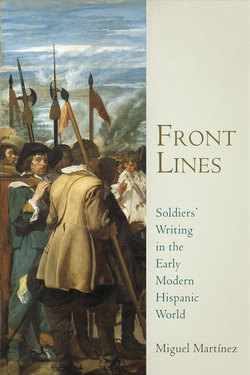Front Lines

Реклама. ООО «ЛитРес», ИНН: 7719571260.
Оглавление
Miguel Martinez. Front Lines
Отрывок из книги
Front Lines
SERIES EDITORS
.....
Literacy rates, I argued earlier, seem to have been higher in the army than in other social spaces and professional groups, allowing for the articulation of relatively large publics. Bernardino de Escalante took for granted that many infantrymen, to whom he addressed his Diálogos del Arte militar (1583), would be able to read his book. “I decided to write these military dialogues,” he says, “so that the fresh, unexperienced recruits can quickly become expert soldiers by reading them” (me determiné a hacer estos diálogos militares … para que los soldados bisoños, leyéndolos, se hagan pláticos en breve tiempo).88 Being a priest and a commissary of the Holy Office of the Inquisition at the time he wrote his treatise, Escalante made sure to point out that he had been “raised in war since childhood,” once again grounding his discursive authority in his own military experience. It was natural for military writers to assume that their works would circulate fluidly and rapidly among the spaces of war, and he envisioned his treatise helping soldiers in “the provinces of Peru, New Spain, the Philippines and other islands of that ocean.” Furthermore, just as bisoños were expected to be trained in the arts of war by the pláticos, it seems that training in letters was also part of the process of military socialization. Escalante offers his work as only a provisional contribution to the art of war “until some of you can write with more propriety about this art, since you practice it so courageously” (hasta que algunos de vuestras mercedes escriban con más propriedad esta arte pues la ejercitan con tanto valor). If we believe Escalante, the ability to read and write seems to have been widespread among those “illustrious gentlemen” (muy ilustres señores)—a common form of soldierly respectful address, regardless of social background—“of the Spanish infantry that serve in the presidios of the kingdoms and estates of king Philip, our lord” (de la infantería española que asiste de presidio en los reinos y estados del rey Felipe nuestro señor).89 Escalante was not particularly self-delusional: a Jesuit criticizing the newly founded Reales Estudios de San Isidro (1629) claimed that what was taught in the Chair of Fortifications in one year “would be read amply by a soldier from Flanders in three months.”90 Books must have been as familiar a presence on the front line as in the college classroom.
Texts, as Escalante suggests and we know well, also traveled easily between the Old World and the New thanks to a large extent to the conquistadores and settlers who ventured to cross the Atlantic. The circulation and consumption of books, particularly those of chivalry, among the Spanish conquistadores is a well-known story since Irving Leonard’s classic study, although his idealizing view of this phenomenon has been rightly criticized.91 Books also circulated among garrisoned or retired soldiers in the Indies. In his will, the Chilean veteran Melchor Xufré del Águila declared that he owned “about eighty bound books” (como ochenta cuerpos de libros), most of which we should assume came from Spain. The retired soldier also stated that he left “a ream of paper” (una resma de papel) and three more books at Lieutenant Andrés de Góngora’s house, which he was supposed to sell as part of a debt settlement.92 According to Bernal Díaz, moreover, the conquistadores of Mexico carried in their memories romances viejos—old narrative ballads of octosyllabic verse that rhymed assonantically—that were frequently sung during the conquest wars and to a certain extent shaped their interpretations of New World events. In turn, the heroic feats of the respected commander Hernán Cortés gave way to the composition of new ballads that were transmitted orally and crossed the Atlantic back to the metropolis.93
.....